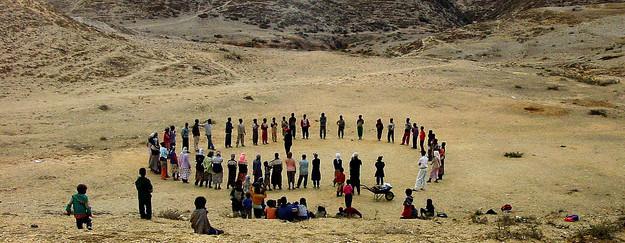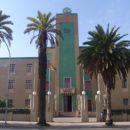Review: Borderlines by Michela Wrong

In a novel with clear analogies to Eritrea and Ethiopia, Wrong writes with sensitivity but doesn’t take any prisoners.

Residents of a refugee camp near the border between Eritrea and Ethiopia gather together for a group activity. Photograph by Roberto Maldeno.
Journalists have to report news and analyse it as stories break. Novels take longer to incubate and it is rare that a novel appears in time to illuminate one of the most significant phenomena of our era – migration. Borderlines by Michela Wrong (Fourth Estate) has achieved that happy conjuncture.
Wrong is a journalist and writer who has written three path-breaking books on Africa, including one about Eritrea. She is half-Italian, which may give her more feel for Eritrea – formerly an Italian colony – than most outsiders. Eritrea it is one of the least understood countries in the Horn of Africa. It is small, poor, and run by an authoritarian state with low regard for human rights. Its wretched condition has led to an increasing exodus of migrants in the last few years escaping oppression, poverty and compulsory open-ended military conscription.
Eritrea is also a country at war with its neighbour, Ethiopia, over a boundary dispute. Eritrea has won a victory on this in international arbitration, but it has been a Pyrrhic victory, and Ethiopia’s refusal to accept the decision means the small David state remains on a war footing vis a vis its neighbourhood Goliath. Western actors court Ethiopia’s Goliath with diplomatic backing and aid, while Eritrea’s David is isolated and penalised for his imperfections, not least for forcing so many exiles to take the hazardous journey to seek refuge on European shores. Eritrea’s people are bonded by a common experience of war and a determination not to give up the independence they won so bloodily from their neighbour.
This is the context, vividly explained with a sympathetic but unsparing eye by Wrong, for a cracking story, or trio of stories, in Borderlines. The central theme concerns a female lawyer called Paula and her adventures. Paula joins a team of international lawyers, sympathisers committed to helping the unlovely government of North Darrar (Eritrea in disguise) uphold its claim in a border dispute against its old imperial master, former ally and current enemy, Darrar (Ethiopia). The work of preparing for and then undertaking international arbitration races along. There is nothing dry or bloodless in this account.
In the background is the second tale, Paula’s past love story, luridly told and tragically ended. This is curiously less satisfying though much sexier than the book’s third strand: the intriguing but more filigree treatment of Paula’s lesser relationships such as with the black US lawyer leading her team, and others, including citizens of North Darrar.
There is a sub-set of unlovable expatriates, called up to play the “˜boo-hiss’ parts: they are painted as unworthy of the salaries and trust reposed in them to act in the interests of struggling states.
The North Darrarians themselves first stimulate then drain our heroine’s sympathies. She feels increasingly the oppressive reach of the regime she has chosen to serve. Its creepy servants poison her emotional reserves and corrupt the human relationships she has developed. Her exasperation and disillusionment lead her to a generous but unforgiveable act of folly in retaliation for its tyrannies. The denouement is perilous for Paula. I read into the small hours to discover how things turned out.
This book really grips the reader. It gathers pace and strength right to the end.
As for the government of Eritrea, they have so far kept their own counsel about this novel. They may be unaware of it, or they may have dismissed it as an irrelevant distraction from their fight to assert their rights. If, however, they regard it as hostile, and retaliate, they will make a mistake: the author’s scepticism is overwhelmingly directed at outsiders who do injustice to the rights of a small and proudly self-sufficient people. Eritrea should rejoice that in Michela Wrong they have a writer who takes no prisoners but explains with understanding North Darrar’s struggle to maintain its self-respect. For that struggle is also Eritrea’s.
Sir Edward Clay is a former British diplomat, sometime high commissioner to Uganda, Cyprus and Kenya, and ambassador to Rwanda and Burundi
For more details about Borderlines, click here.






Michela Wrong is an excellent writer with a compelling literate readable style and her previous writings all have been well researched and documented.
I am confident that this novel will indeed be a read most excellent and following my return back to Toronto from DRC for Christmas I look forward to purchasing this novel with anticipatory reading.